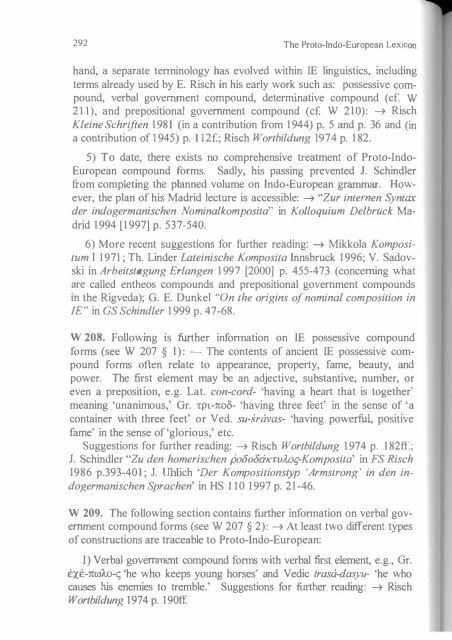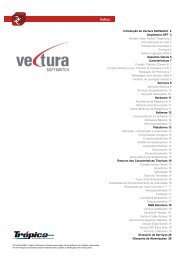You also want an ePaper? Increase the reach of your titles
YUMPU automatically turns print PDFs into web optimized ePapers that Google loves.
292 The Proto-indo-European LexiconWord Fonnation293hand, a separate tenninology has evolved within lE linguistics, includingterms already used by E. Riseh in his early work such as: possessive compound,verbal government compound, determinative compound (cf. W21 1), and prepositional government compound (cf. W 210): RisehKleine Schriften 1981 (in a contribution from 1944) p. 5 and p. 36 and (ina contribution <strong>of</strong> 1945) p. 112f.; Riseh Wortbi/dung 1974 p. 182.5) To date, there exists no comprehensive treatment <strong>of</strong> Proto-IndoEuropean compound forms. Sadly, his passing prevented 1. Schindlerfrom completing the planned volume on Indo-European grammar. However,the plan <strong>of</strong> his Madrid lecture is accessible: "Zur intemen Syntaxder indogermanischen Nominalkomposita" in Kolloquium Delbruck Madrid1994 [1997] p. 537-540.6) More recent suggestions for further reading: Mikkola KompositumI 1971 ; Th. Linder Lateinische Komposita Innsbruck 1996; V. Sadovskiin Arbeitstagung Erlangen 1997 [2000] p. 455-473 (concerning whatare caUed entheos compounds and prepositional government compoundsin the Rigveda); G. E. Dunkel "On the origins oJ nominal composition inlE " in CS Schindler 1999 p. 47-68.W 208. FoUowing is further infonnation on lE possessive compoundfo rms (see W 207 § I): - The contents <strong>of</strong> ancient lE possessive compoundforms <strong>of</strong>ten relate to appearance, property, fame, beauty, andpower. The first element may be an adjective, substantive, number, oreven a preposition, e.g. La!. con-cord- 'having a heart that is together'meaning 'unanimous,' Gr. pl-1t08- 'having three feet' in the sense <strong>of</strong> 'acontainer with three feet' or Ved. su-sravas- 'having powerful, positivefame' in the sense <strong>of</strong> 'glorious,' etc.Suggestions for further reading: Riseh Wortbildung 1974 p. I 82ff.;J. Schindler "Zu den homerischen PoOooaKTVA-oq-Komposita' in FS Risch1986 p.393-401; J. UhIich 'Der Kompositionslyp 'Armstrong' in den indogermanischenSprachen' in HS 110 1997 p. 21-46.W 209. The fo Uowing section contains further infonnation on verbal governmentcompound forms (see W 207 § 2): At least two different types<strong>of</strong> constructions are traceable to Proto-Indo-European:I) Verbal government compound fonns with verbal first element, e.g., Gr.exe-1tCJlAo-C; 'he who keeps young horses' and Vedic /rasa-dasyu- 'he whocauses his enemies to tremble.' Suggestions for further reading: RischWortbi/dung 1974 p. 190ff.2) Verbal government compound fonns with a verbal second element: -What are caUed root compound forms represent an archaic group, e.g., La!.,in-ceps < "primo-cap- 'he who takes the first part' and con-iug- 'boundfogether,' Gr. xep-vt!l- (which was represented y in Mycenaean,aske-ni-qa i.e. id'err-nigW-) '(water) that washes hands and VedlC havzr-ad'eating the food <strong>of</strong> sacrifice.' The second element is not, as is generaUy supposed,a nominal root, but rather a verbal root: Scarlata Wurzelko"!positaim !J.g- Veda 1999 p. 765f. Suggestions for further reading: In additIon toScarlata, see particularly Benedetti Composti radicali 1988. - The morecommon type in ancient rE languages is that exemplified by Gr. lCoupmp04>





